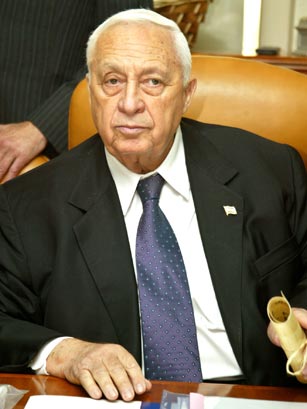
Israeli Prime Minister Ariel Sharon opens a weekly cabinet meeting at this office. Sharon convened the cabinet for a vote expected to approve a U.S.-backed "road map" leading to Palestinian statehood, despite opposition from far-right ministers
(3 of 3)
Hamas officials rejected the call to give up their weapons. And Israeli officials remain wary. In his airy corner office in Israel's brand new Foreign Ministry, Shalom "wants to be convinced" by Abbas, but isn't yet. "His speech starts well, but he still makes the old demands," Shalom told TIME.
Fatah gunmen from the Aqsa Martyrs Brigades have the same reservation: they say they would have been ready to hang up their Kalashnikovs if Abbas had cleared Arafat's corrupt party hacks from his cabinet. "We would have been confident that our affairs were in clean hands," says a Brigades leader in Ramallah. Instead, Abbas was forced to let most of Arafat's cronies retain their jobs. After the Palestinian Authority Chairman agreed under intense international pressure to cede most of his powers to the Prime Minister a month ago, he has been working backstage to muscle many of them back. Abbas has control of the Palestinian Authority's money, but Arafat retained control over the bulk of Palestian forces, making it doubly hard for Abbas to go after terrorists.
That is the road map's chief problem. Security is the one element that Abbas must deliver, if there is to be any cooperation from Sharon. Before Secretary of State Colin Powell visits late this week, Sharon is likely to make a cosmetic concession, perhaps evacuating a few illegal settlement outposts, as he began to do last week. But Shin Bet officials tell Time they have not yet been asked by Sharon to recommend any potential measures, such as troop withdrawals or loosening of roadblocks, that could be real incentives to Abbas.
There's not much beyond cheerleading that the U.S. can do to help the Palestinian Premier. The Bush Administration may not even get a chance to do that: Abbas recently told the U.S. that it would undercut him if Powell met with him but not Arafat. But State Department sources say Powell will not sit down with Arafat; will Abbas sit down with Powell? U.S. diplomats were scrambling to come up with a solution so Powell could finally weigh in, having already delayed a trip to Jerusalem because Abbas said it was too soon after his confirmation to be embraced by the American. But in the end, the success of the road map rests on Bush's willingness to lean on Sharon, the immovable object who stands squarely between progress and failure. This time, says a senior White House aide, "the President is serious as a heart attack." Maybe. However attractive the image of peacemaker may look to him, though, Bush may look ahead to next year's election and think twice about going up against American Christians and Jews who are ardently pro-Israel. Like Sharon and Abbas, he has plenty of reason not to drive the road mapped out before him.